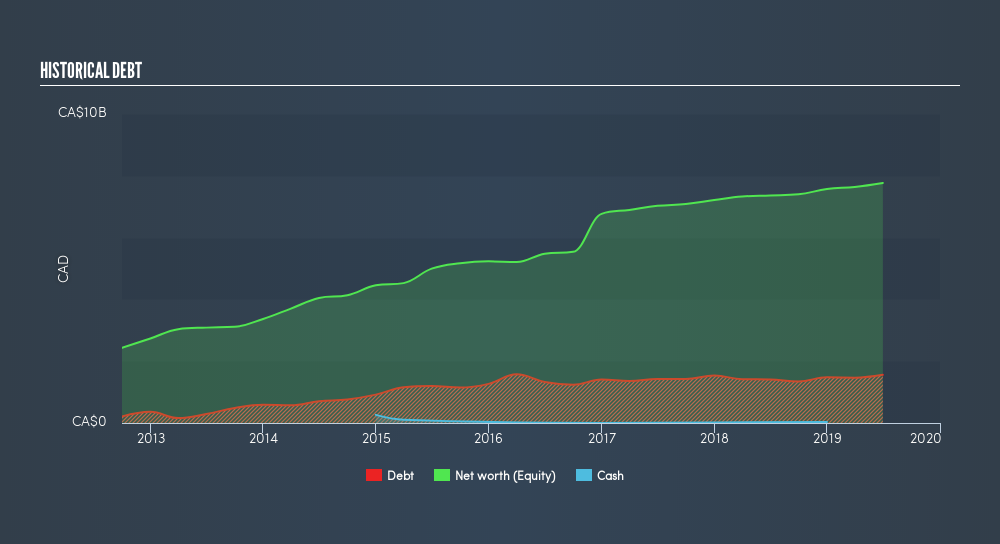
Some say volatility, rather than debt, is the best way to think about risk as an investor, but Warren Buffett famously said that 'Volatility is far from synonymous with risk.' So it might be obvious that you need to consider debt, when you think about how risky any given stock is, because too much debt can sink a company. Importantly, Tourmaline Oil Corp. (TSE:TOU) does carry debt. But should shareholders be worried about its use of debt?
When Is Debt Dangerous?
Debt is a tool to help businesses grow, but if a business is incapable of paying off its lenders, then it exists at their mercy. Part and parcel of capitalism is the process of 'creative destruction' where failed businesses are mercilessly liquidated by their bankers. While that is not too common, we often do see indebted companies permanently diluting shareholders because lenders force them to raise capital at a distressed price. Of course, debt can be an important tool in businesses, particularly capital heavy businesses. When we think about a company's use of debt, we first look at cash and debt together.
See our latest analysis for Tourmaline Oil
How Much Debt Does Tourmaline Oil Carry?
The image below, which you can click on for greater detail, shows that at June 2019 Tourmaline Oil had debt of CA$1.56b, up from CA$1.41b in one year. However, because it has a cash reserve of CA$35.3m, its net debt is less, at about CA$1.52b.

How Strong Is Tourmaline Oil's Balance Sheet?
Zooming in on the latest balance sheet data, we can see that Tourmaline Oil had liabilities of CA$366.4m due within 12 months and liabilities of CA$2.70b due beyond that. On the other hand, it had cash of CA$35.3m and CA$169.2m worth of receivables due within a year. So its liabilities outweigh the sum of its cash and (near-term) receivables by CA$2.86b.
This is a mountain of leverage relative to its market capitalization of CA$3.50b. This suggests shareholders would heavily diluted if the company needed to shore up its balance sheet in a hurry.
We measure a company's debt load relative to its earnings power by looking at its net debt divided by its earnings before interest, tax, depreciation, and amortization (EBITDA) and by calculating how easily its earnings before interest and tax (EBIT) cover its interest expense (interest cover). The advantage of this approach is that we take into account both the absolute quantum of debt (with net debt to EBITDA) and the actual interest expenses associated with that debt (with its interest cover ratio).
With net debt sitting at just 1.1 times EBITDA, Tourmaline Oil is arguably pretty conservatively geared. And it boasts interest cover of 7.6 times, which is more than adequate. On top of that, Tourmaline Oil grew its EBIT by 51% over the last twelve months, and that growth will make it easier to handle its debt. When analysing debt levels, the balance sheet is the obvious place to start. But it is future earnings, more than anything, that will determine Tourmaline Oil's ability to maintain a healthy balance sheet going forward. So if you want to see what the professionals think, you might find this free report on analyst profit forecasts to be interesting.
Finally, while the tax-man may adore accounting profits, lenders only accept cold hard cash. So it's worth checking how much of that EBIT is backed by free cash flow. During the last three years, Tourmaline Oil burned a lot of cash. While that may be a result of expenditure for growth, it does make the debt far more risky.
Our View
Neither Tourmaline Oil's ability to convert EBIT to free cash flow nor its level of total liabilities gave us confidence in its ability to take on more debt. But its EBIT growth rate tells a very different story, and suggests some resilience. Looking at all the angles mentioned above, it does seem to us that Tourmaline Oil is a somewhat risky investment as a result of its debt. That's not necessarily a bad thing, since leverage can boost returns on equity, but it is something to be aware of. Given our hesitation about the stock, it would be good to know if Tourmaline Oil insiders have sold any shares recently. You click here to find out if insiders have sold recently.
If you're interested in investing in businesses that can grow profits without the burden of debt, then check out this free list of growing businesses that have net cash on the balance sheet.
We aim to bring you long-term focused research analysis driven by fundamental data. Note that our analysis may not factor in the latest price-sensitive company announcements or qualitative material.
If you spot an error that warrants correction, please contact the editor at editorial-team@simplywallst.com. This article by Simply Wall St is general in nature. It does not constitute a recommendation to buy or sell any stock, and does not take account of your objectives, or your financial situation. Simply Wall St has no position in the stocks mentioned. Thank you for reading.
About TSX:TOU
Tourmaline Oil
Engages in the acquisition, exploration, development, and production of petroleum and natural gas properties in the Western Canadian Sedimentary Basin.
High growth potential with adequate balance sheet.
Market Insights
Community Narratives



